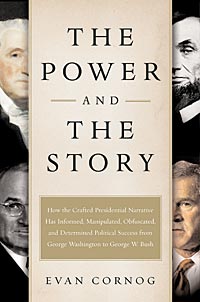
Forget who’s got the bigger “war chest,” it’s
the candidate with the best story to tell who’s got the real advantage in presidential politics.
Armed with this provocative thesis, historian Evan Cornog proceeds to reexamine pivotal presidential
elections as a battle between the candidates’ life narratives. Andrew Jackson, for example,
was catapulted to enduring fame (and viable candidacy) in 1815, when he triumphed over a superior
British force at the Battle of New Orleans. Never mind that the conflict, coming two weeks after
the formal conclusion of the War of 1812, was militarily irrelevant.
That story, and many that follow, in Cor- nog’s long (and repetitious)
volume point to a disturbing trend: what Cornog calls “the relative unimportance of truth.”
From George Washington’s cherry tree to George W. Bush’s conflation of 9/11 and Saddam
Hussein, it’s clear, “A good story trumps a true story almost any day.”
Cornog occasionally oversells his point, yet this is an important and
deeply disturbing work, as it fully explores the decisive power of myth in our choosing of a national
leader. This is a truly disheartening view in our media- defined era: It’s not, “May
the best man win”; it’s more like, “May the best storyteller (or spinmeister)
prevail.”















